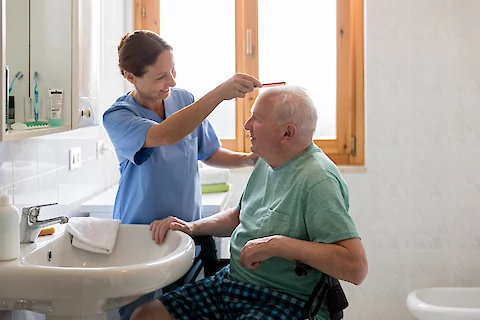
Sometimes, seniors can suffer from lethargy and depression. And more often than not, it interferes with the maintenance of their personal hygiene. This is a huge concern because it increases their risk for illnesses and infections which their bodies are already vulnerable to. To support your elderly relative at home with their health issues, learn what you should do when they struggle with personal hygiene issues.
Recognizing the Symptoms of Depression and Lethargy in Seniors
Depression manifests in many ways, making it difficult to pinpoint. So pay attention to any changes in behavior or mood that your elderly relative may be exhibiting.
Low energy and lack of interest are one of the most telling signs that your seniors are dealing with mental health issues. Another indicator is a sudden decrease in personal hygiene practices such as bathing, brushing teeth, changing clothes, or neglecting simple grooming habits like combing hair or manicuring nails.
When you do notice such changes, it’s important that you talk with your elderly loved one about how they’re truly feeling. Then, consider seeking professional help. Consulting with a doctor can help you determine the underlying cause of their condition. Do research to find local mental health providers specializing in seniors, or contact your county or city resources for assistance finding mental health care specialists.
How to Promote Senior Self-Care
While it is essential to seek the help of a professional if your elderly relative's depression is interfering with personal hygiene, you can also take actionable steps at home. Creating a routine and sticking to it helps promote healthy habits. And it gives structure to days that may have previously felt messy or out of their control.
Keeping their environment safe and clean can also help boost their mood and prevent them from feeling overwhelmed by tasks. You can also try simple exercises like walking in the park to help lift their spirits. This can lift some of their worries and hopefully have them refocus on themselves.
Above all, emotional support from family and friends is integral for helping your senior loved ones cope with mental health challenges.
Where to Find Support for a Senior Loved One
While it’s important that your senior loved one has support, it’s also vital that you have your own support network. No one should have to tackle the challenges of caring for an elderly relative alone. Reaching out to friends, family, and local resources can help you find support from others who deeply care about the senior in your life.
Contact their doctor or a professional with experience in senior health conditions to discuss any concerns. Reach out to your county's office about various assistance services like Meals on Wheels, meal delivery services, and daycare centers specializing in seniors' needs. These resources may provide full-time caregivers depending on eligibility requirements.
Looking for In-Home Support For a Senior Loved One?
Caring for a senior family relative can seem overwhelming, especially when depression or lethargy interferes with daily activities such as personal hygiene. While it's important to seek care immediately from medical professionals, there are many ways you can help seniors cope with challenging mental health issues. With helpful resources, local services, and an actionable routine that promotes self-care, you can ensure your loved one takes all the necessary steps to maintain their overall health while providing the emotional support they need.
If you live in Santa Rosa, Ukiah, Sebastopol, or Rohnert Park areas in California and are looking for reliable in-home Senior Care assistance for your loved ones, reach out today! Our friendly team at Senior Helpers Santa Rosa Wine Country will be happy to answer any of your questions and provide a free assessment so that we can create a personalized plan specifically tailored to fulfill all the needs of the senior you love.